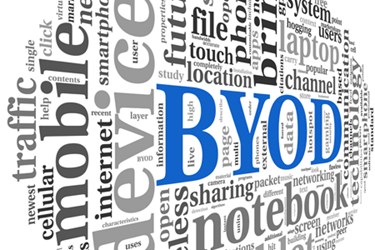The Growing Importance Of A BYOD Policy — In Light Of The Growing Number Of Devices
By Nick Rojas, contributing writer

It seems like the phrase BYOD, short for “bring your own device,” has scarcely caught on, and now we’re in the position of needing another. Indeed, with the announcement of the eminently expected Apple Watch and the various and multifarious forms of Android Wear, it seems that wearable technology is finally ready to have its day in the sun. Not since the thankfully short-lived age of the Bluetooth headset have so many people been talking excitedly about strapping buzzing bits of electronics to their body in new and inventive ways.
Bring-your-own-device policies have played a key role in the adoption of new technologies and their adaptation to all kinds of business models. Given the freedom to use their own device at work, employees will often choose that device simply because they are most familiar with it. It’s a known fact that people become quite attached to their devices. It’s hard to estimate the value of the countless hours saved when you don’t need to train your employees to use a new device, instead trusting them to already know how to use their own personal devices.
But there have been security breaches because of bring your own device technology. A user who brings his personal laptop to work and uses that instead of a company device also takes that device home and to other, more public spaces as well, such as mass transit or cafes. A stolen laptop used for professional purposes can, if it falls into the wrong hands, cause a serious security breach for companies.
As is the case with all new technologies, widespread adoption of these devices will prompt a radical reorganization of existing rules and conventions. Organizations may not know exactly when they will need to address these issues and needs, but it’s inevitable, and having a plan in place to ensure a smooth transition will be useful.
As with all new technologies these days, opportunities for surveillance exist despite the best intentions. Both the threat of malware being introduced by devices that employees bring in to the even more disturbing possibility of data theft need to be addressed for wearable technologies.
This threat to privacy represented by new technologies pervades all levels and areas of society, and your business and your customer’s business is not immune. This article does not propose to solve the extremely complex and endlessly discussed topic of privacy in the future, but should serve as a simple warning: employers should be aware of possible risks, but not be blind to the possible benefits.
Whether or not distinct benefits imparted by the adoption of wearable technologies is worth the increased risk of leaks and other security breaches depends on your industry and the role of privacy within your company. Ultimately, each company evaluate the possible costs and benefits and make its own decision.
However, all of the risks associated with wear your own device technology can also be applied to bring your own device technology. In fact, in many cases, because of the up until now fairly peripheral uses of wearable technology, the posed by losing a laptop that has been used for work still far outweigh the possible risks of a lost, say, fitness tracker. As the technology associated with wearable devices develops, this will certainly change, but for now, the risks posed seem quite similar.
Though wearable devices are still in their “Precambrian” period, where multitudes of odd forms proliferate, it seems that existing BYOD policies may only need to be slightly modified. The real lesson here is that our lives are increasingly saturated with technological devices, and any company without a real policy for how devices should be used is asking for trouble. The proliferation will only increase as time goes on, and if you don’t already have a BYOD policy, it’s high time to adopt one.
Nick Rojas is a business consultant and writer who lives in Los Angeles and Chicago. He has consulted small and medium-sized enterprises for more than 20 years. You can follow him on Twitter @NickARojas.
